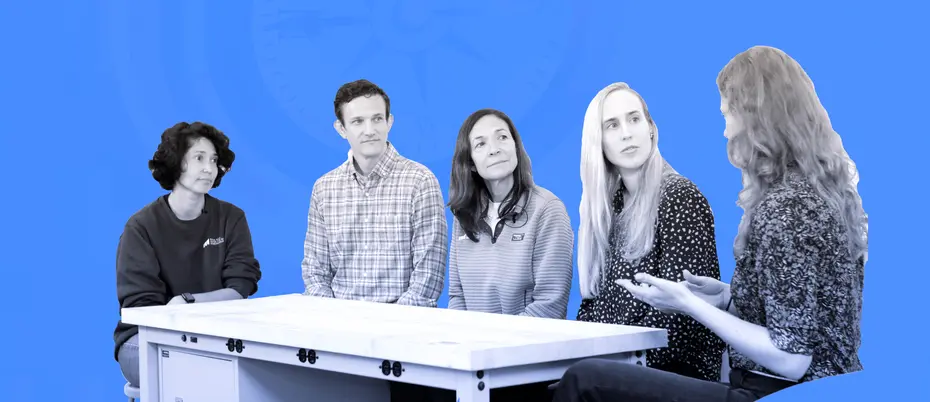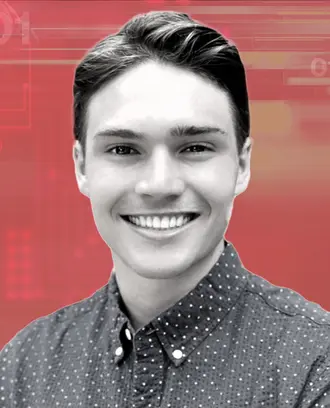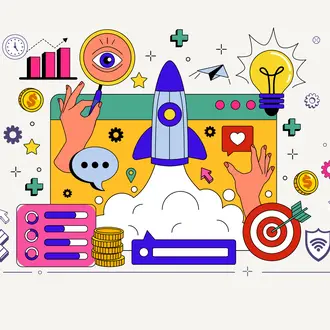What you’ll learn:
- Today’s turbulence offers a counterintuitive advantage to savvy founders.
- Success metrics for startups are shifting away from head count and VC dollars and toward capital efficiency.
- It’s time to rethink the traditional entrepreneurial model of frenzied days and sleepless nights.
How should startup founders navigate today’s volatile economic landscape? In a roundtable discussion, five entrepreneurs-in-residence from the Martin Trust Center for MIT Entrepreneurship shared the strategies that separate successful startups from those that struggle when capital becomes scarce.
The video below includes discussion on why discipline, strong unit economics, and strategic focus aren’t just good practices — they’re survival elements in today’s market.
A transcript of the conversation follows the video.
Jenny Larios Berlin (co-founder, Optimus Ride and limeShift): Maybe we start by phrasing the question, right? We have a lot of students, and they’re asking us what advice we have in the current economic times and so forth. And I don’t know; what have you been saying in office hours?
Susan Neal (co-founder, Atacama): Starting a new company is difficult anyway. A lot of the challenges, and what’s happening right now, both politically and economically, [are] just exacerbating what’s already a difficult journey. And I think it’s because of the uncertainty. It seems like one day we have tariffs, the next day we don’t. Not that that affects every company, but certainly for the ones that are impacted by those kind of decisions, it’s tough. It’s tough.
The emotional impact of uncertainty
Macauley Kenney (adviser, SurgiBox): Thinking about starting something new with a company — that’s emotionally tough. You’re jumping off into the unknown. You know that it’s going to be tough. I’ve been hearing from people who don’t have the emotional bandwidth to do that and talking about what that looks like for them. And I don’t have a good answer for that because I know that it’s going to be tough to start a company. And if you’re already really burnt down by everything else, I want to be able to pick you up to do that, and also make sure that you’re setting yourself up for success. And I’ve found that really hard to balance.
Devon Sherman Daley (advisory member, Howe Innovation Center): It’s interesting because there’s that group of students, but there’s also a group of students that really ignite their personal passions. There’s times of a lot of uncertainty, a lot of extreme stuff happening in the world right now, and people can get very motivated to go after a problem they want to solve and take ownership of as well. So it’s like two kind of extreme reactions to it.
Disciplined entrepreneurship
Sherman Daley: Building off of what Susan said, so much of what we talk about is discipline with entrepreneurship. And I don’t think that message changes. We talk about “Figure out who’s your customer. What can you do for your customer?” before you go out and build the full-fledged product, and it’s just really doubling down on that message. And why do we share that message? It’s to create those sound unit economics. This isn’t really new, right? The last 10 to 15 years, it’s been an increased focus on unit economics with COVID and [with] interest rates going down in 2022. So this is just furthering that message in a lot of ways, and I think there’s less luxury to be undisciplined in this environment.
Antifragility and strategic focus
Neal: Well, it’s just as you talk about disciplined entrepreneurship, we know Bill [Aulet, Trust Center managing director] talks about being antifragile, so this is potentially the time to be taking advantage of this situation. You can imagine entrepreneurs coming up with ideas to help with some of the uncertainty. There’s got to be business opportunities.
Chris Moses (co-founder, Arsenal Health): And I think it really requires strategic focus. In years past, when there was the opportunity to be absolutely flush with capital, you could throw a lot of money at a lot of different projects and see which product or product line could be more viable. And now we actually have to bring that discipline even more so to improve the unit economics, but also to figure out which products we should double down on and really deeply understand what value we are creating so we can actually capture some of that revenue and build that financial sustainability.
Larios Berlin: Going back to your point about antifragility, I spend a lot of time talking about that piece with students because it’s [about] “How are you learning to listen to yourself so that you can reframe things from an opportunity space?” And the truth of the matter is that companies that start in difficult times are actually stronger because they understand the challenges, because they’re leaning into the uncertainty, because they want to still succeed despite all of those different obstacles.
And so I’m like, “Listen, how do you turn this into opportunity juice for you and kind of push forward and make sure that you’re finding the right community of support?” Because, to your point, too, it’s a journey and it’s a marathon. This is not a sprint. The highs are high, the lows are low. And how are you taking care of yourself in that entire process?
Redefining entrepreneurship and success metrics
Kenney: I think you and I have talked about this a little, and we come from different perspectives on this, which I love, but I feel like it’s also kind of reshaping what it means to be an entrepreneur. A lot of the students that I talk to, the cultural narrative is that you are locked in. You are 25/7. This is your lifeblood. And I think that that’s more viable when the markets are flush with cash, when there aren’t a million other things in the world demanding your attention.
There’s also an opportunity to rethink “How do I pursue this in a way that economically, emotionally, and structurally makes sense for me?” whether that’s taking a full-time job and pursuing this on the side, juggling a couple of other things, [or] rethinking what your capital strategy looks like. I think it’s opened up more creative options that might actually allow more people to be entrepreneurs because they’re not seeing just one way to do it.
Moses: I’m actually really excited to see the change in conversation around the success metrics. Before, it was all about “How much money did you raise? How many employees do you have?” And now it’s all about that capital efficiency. It’s like, how much annual recurring revenue can you actually generate with how few employees? And I think it’s actually a really healthy thing.

Strategy for Startups: From Idea to Impact
In person at MIT Sloan
Register Now
AI’s impact and financial challenges
Moses: Talking tactics for a second, I think AI is actually one of the biggest things that is driving some of the most successful companies right now. You’ve got to be AI-native. You’ve got to be able to bake it into the fabric of what you do in order to hit those kinds of multiples.
Neal: I have to say the timing is with AI and the fact that it doesn’t require a lot of resources or a lot of money to build a business, particularly one that has a large component of AI. [That business model] is kind of ideal for this time because the other thing that’s happening is just in terms of raising money. I mean, you look at the statistics for our VCs and even now, I believe, the angels — I’m hearing stories. It’s like everyone is nervous about what’s happening. So we need our entrepreneurs to be more resourceful, and AI, I think, is a tool.
Supportive ecosystems and global markets
Kenney: I hate to be a negative voice, but not all companies can rely on AI that well. So I do think there’s a chilling effect on some of the companies that have most ... not the most but a substantial chance of impact in the life sciences and climate and energy and biotech and medtech that can’t just shrink down, that do require a lot of capital.
The opportunity there is to continue to build a supportive ecosystem. You might not be the entrepreneur leading that company, but are you the consultant helping them get a little further? Are you the lawyer who’s advising them on how their strategic plan is? I think that there should be a societal acknowledgement that we need these companies.
We need the next cure for ... the cure for Alzheimer’s. We need the next lifesaving medical device. And knowing that it’s become a harder path for them, what can we do to support and to build that ecosystem around them to make sure that society isn’t going to be at a loss without it?
Moses: If you actually expand your scope beyond the U.S. market, there are so many other markets that we can think about, and, especially in these kinds of economic climates, you may have to actually go that direction in order to be successful.
Larios Berlin: When I think about even sustainable living, poor countries are the most sustainable because they’re living within constraint. And so for me as an entrepreneur, I’m like, what can I learn there and how can I scale that?
Entrepreneurship in the U.S.
Kenney: I love the global view and I also ... I’m not hunting for a silver lining, but I think that it will be interesting to see how entrepreneurship can play a role in the U.S. in the current political climate. Because within my friends, myself, and the students that I work with, there can sometimes be a feeling of helplessness. What do we do?
I feel strongly about everything that’s going on, and I don’t know how to move the needle. And I think that entrepreneurship could be an answer for that in a lot of dimensions. This might push people into positive action in a way that they might not have felt before in less-stressful times.
The importance of fundamental principles
Kenney: Our methodology of what we teach is human-centered design. It’s “Who is your user?” and “Let’s test your hypotheses before rolling everything into action.” Those are fundamental principles that are so valuable in literally every industry.
Larios Berlin: I appreciate that too, because it’s not just “go fast and break things.” It’s being disciplined. It’s articulating your process and making sure that the people that you’re working with understand what you’re doing and are with you.
It’s also important that we teach that entrepreneurship is a team exercise. It’s not this individual mercurial, charming person. It’s “How are we working together to really demystify the problem that we’re trying to solve?”
Neal: Well, just jumping in — in terms of the mindset, of teaching corporate entrepreneurs, there is that opportunity just like local government, and there’s no reason our students, if joining an existing organization and not necessarily starting something on their own, can’t be entrepreneurial and innovative within a larger context. And we see a lot of students kind of gravitating toward that for financial reasons or what have you, [maybe] risk reasons, but I think that’s where they can be successful, a lot of them.
Moses: One of the things that we need to be careful about — especially as we intersect civics and entrepreneurship, and agriculture and entrepreneurship, all these different industries — is now that AI is becoming part of the fabric of how we do things and what we do, it can actually make us a bit lazy.
I’m a little afraid we’ll become less disciplined as the output from these tools becomes gospel and people trust them too much — [that] we become a bit too overconfident in the quality of the output, and it actually could make us a bit lazy. We could skip steps and move a little bit too quick. So I think stressing the fundamentals is going to be really important: How can we actually follow this disciplined progress while using AI tools to discover new things or make things a bit more efficient?
Innovation and entrepreneurship
Kenney: That’s why the methodology is so important. And I like Susan’s point about innovation, innovation and entrepreneurship go hand in hand. And we have this vision of what it means to be an entrepreneur. And you talked about all the myths surrounding that, but also, innovation can exist in all these different industries.
I was on a panel at a Sloan class, Business and Ethics, a couple of weeks ago. It was me, a priest, a journalist, and a doctor, which sounds like the start of a joke. But they were talking [about], how can you be innovative in another field? And I love to push the students to get into that mindset.
I was talking with the doctor. Asking about someone’s pronouns for gender-affirming care? That’s innovative. Thinking about, what does it mean to show up holistically for someone? That’s innovative. Talking as a journalist, how do you protect whistleblowers or prevent against doxing while also making sure that you have fact-checked sources? That all requires innovation.
[Entrepreneurship] is not necessarily just starting a company. It’s saying, “Let’s look at what’s being done,” and “How am I going to chart the course forward?” and “I don’t have to follow that old playbook.” And I think that that’s part of the methodology that we teach.
The mission of the Martin Trust Center for MIT Entrepreneurship is to advance knowledge and educate students in innovation-driven entrepreneurship in a manner that will best serve the world in the 21st century. Its entrepreneurs-in-residence are accomplished business leaders who advise students on the challenges — and benefits — of startup life, stoking passions and propelling a culture of innovation. Each EIR brings a body of knowledge and work experiences to their role.





